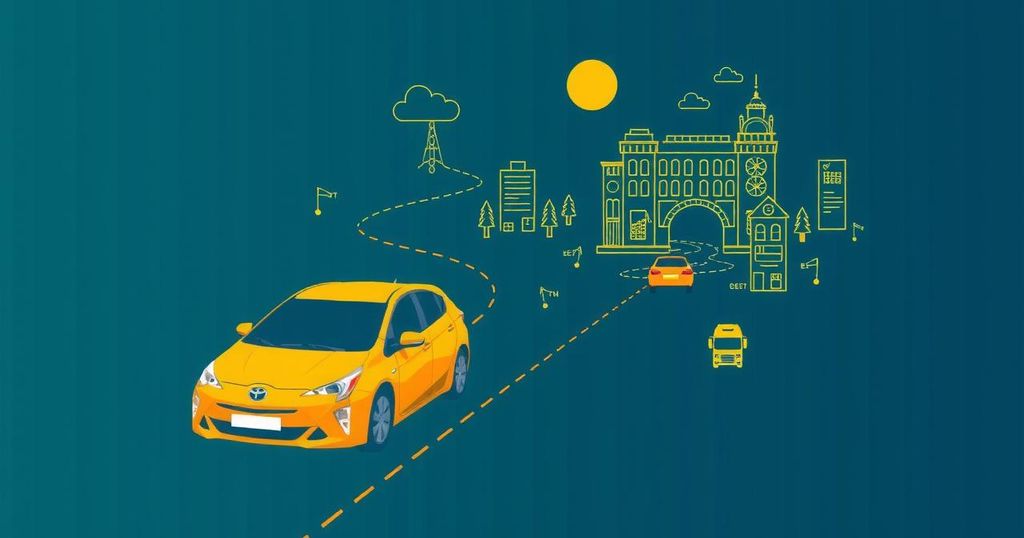Confronting Car Dependency: A $6.2 Trillion Opportunity for America

A study by the Union of Concerned Scientists indicates that reducing car dependence is essential for climate resilience and could save U.S. residents $6.2 trillion, outweighing the benefits of focusing solely on electric vehicle transition. The report advocates for diverse transportation options and highlights significant health and safety benefits, underscoring the need to combat entrenched auto-centric policies.
A recent analysis conducted by the Union of Concerned Scientists has found that significant policies aimed at reducing car dependency in the United States would result not only in a decreased carbon footprint but also in economic benefits amounting to an estimated $6.2 trillion. This figure surpasses the savings that would arise from solely focusing on electric vehicle adoption. The report, titled “Freedom to Move,” posits that diverse transportation options are essential for facilitating the climate transition, lightening the financial burden on Americans, and fostering healthier, more equitable communities. The findings of the report suggest that by achieving a 27 percent reduction in vehicle miles traveled (VMT) between 2035 and 2050—less ambitious than current objectives in states like California and Washington—the U.S. would be able to forgo approximately $201 billion in new energy infrastructure costs required for the operation of electric vehicles. Furthermore, such a shift is projected to prevent $128 billion in public health expenses associated with emissions from both traditional and electric vehicles. A notable aspect of this shift includes the potential to avert up to 250,000 fatalities and 3.7 million injuries annually, thus reducing the substantial financial implications of vehicle-related accidents. U.S. households could save a combined $5.9 trillion on car payments, fuel, insurance, and other associated costs if the country reduces car dependency, without necessitating a complete abandonment of vehicle use. “What we find is that reducing VMT and ensuring more transit options would be the most equitable approach to achieving these changes,” stated Kevin Shen, the lead author. Moreover, he articulated that this progress does not necessitate complete relinquishments of vehicle ownership but rather encourages changes in travel behavior, such as utilizing bicycles for local trips within more walkable, centralized communities. Despite acknowledging the potential for positive change, Shen highlights the challenge posed by deep-rooted car-centric culture and interests that have shaped transportation policy over the past century. The report illuminates how regulatory frameworks have been influenced by the auto and oil industries, which have historically monopolized funding and stifled alternatives. In 2023, these sectors allocated over $118 million to lobbying efforts, illustrating their extensive grip over transportation policies. The report further emphasizes the growing inequity in transportation accessibility, noting that approximately 30 percent of Americans do not drive. Additionally, a significant proportion of the population suffers from housing and transportation costs that collectively render basic needs financially burdensome, with communities of color disproportionately affected. In addressing these systemic issues, the authors advocate for re-envisioning the concept of freedom associated with transportation. “Freedom has long been associated with automobiles. However, we envision a future where ‘freedom’ encompasses a broader spectrum of mobility options available to all people,” Shen asserted. The authors assert that ending car dependence could be pivotal to effectively addressing climate change and enhancing quality of life for millions of Americans.
The report by the Union of Concerned Scientists encapsulates a critical analysis of the current transportation systems in the United States, particularly highlighting the consequences of car dependency on climate change, public health, and economic expenditures. The study’s findings are contextualized against a backdrop of ongoing discussions concerning sustainable practices and climate action, advocating for more diversified transport options beyond reliance on fossil-fueled vehicles.
In summary, the Union of Concerned Scientists’ report reveals that reducing car dependency can yield significant economic, environmental, and social benefits. The projected savings of $6.2 trillion highlight the value of investing in alternative transport modalities while promoting equitable access and health improvements. As the country seeks to address climate challenges, it becomes evident that the need for transformative change in transportation policy is both urgent and essential.
Original Source: usa.streetsblog.org




